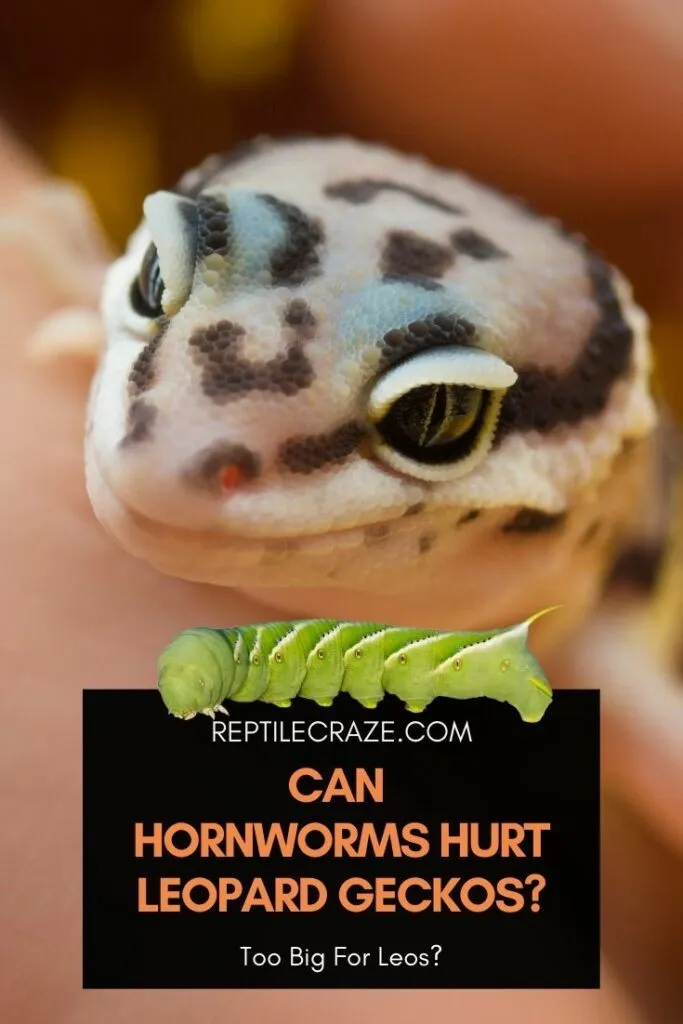
Leopard Geckos owners know that their pets require an adequate feeding schedule and enough nutrients to be healthy and prosperous. However, certain
Hornworms can’t harm Leopard Geckos. However, those found in nature can carry bacteria and parasites, making them potentially toxic for your lizard. Although caterpillars can’t bite your pet, their size can be an issue, mainly for hatchlings. Sometimes, they cause choking, even in adults.
This article aims to check if hornworms hurt Leopard Geckos considering their size. Knowing the possible limitations when adding them to their daily diet is vital.
Table of Contents
Can Hornworms Be Dangerous or Too Big For Leopard Geckos?
Hornworms are 5 inches (12.7 cm) long, light green caterpillars living throughout the US that can be tasty
Sometimes owners are concerned because of hornworms’ big spike, but there is no reason to worry. It is actually soft and can’t physically harm your pet.
Leopard geckos can eat hornworms (as we explain here) since they are harmless and won’t bite or injure your pet, but their size can be a problem, particularly for hatchlings.
Sometimes even juvenile and smaller adults can’t handle very thick full-grown hornworms that can sometimes cause choking.
Choking hazard
Hornworms are more sizable than most other worms, so you shouldn’t be surprised by their common nickname, Goliath worms.
They are juicy, and most lizards, including Geckos, adore their taste and consider them as treats.
However, your small lizard will probably have problems swallowing these giant caterpillars. In most cases, juvenile Leopard Geckos struggle with these fat and powerful creatures and can’t kill them effortlessly.
Therefore, you will often see that your pet avoid killing and chewing offered prey but tend to swallow it whole. It is particularly a case when it is excited or too hungry. As a result, you can expect it to end up with digestive issues.
Your goal is to prevent such a situation. For a start, never keep your lizard hungry for long, determine a feeding schedule, and stick to it.
Offer hornworms to your Gecko only once a week as a treat and always serve them one caterpillar at a time.
That way, your pet won’t be too excited, and there is a chance to eat its meal without harming itself.
There is one trick to be sure if the offered
We explain how to properly feed hornworms to leopard geckos here.
Toxicity and harmfulness
Contrary to what many owners believe, hornworms themselves are not toxic for Geckos. However, they eat tomatoes or tobacco and store toxins these plants contain in their bodies. That may make these caterpillars a poisonous
Additionally, hornworms often cause various health problems in the animals they feed on. For instance, those picked up in nature often carry microorganisms that may cause severe infections in lizards.
Once bacteria or parasites enter your pet’s body, they will live inside its guts, making it sick. In the worst case, these pathogens can even be lethal.
The only way to protect your lizard is to determine the hornworm harmfulness levels, but it is possible only if you are an expert in that field.
Another issue is chemicals, like pesticides and fertilizers. If hornworms living in the wild regularly eat fruits and veggies sprayed with these compounds, your pet will ingest them during the meal.
As a result, it will probably get sick sooner or later.
The best way to prevent health problems in your pet and protect it is to purchase hornworms online or in a pet store.
Are Hornworms Healthy For Leopard Geckos?
Leopard Geckos are insectivorous that prefer a diet primarily made of live insects, but hornworms can be a real treat for them. Since these caterpillars’ bodies make up 85% of the water, they are crucial to keeping your lizard well-hydrated.
Unfortunately, hornworms can’t meet all the Gecko nutritional requirements like any other worms. Therefore, you should offer them in limited amounts.
Even though caterpillars are rich in calcium, they contain a considerably low protein percentage. Too frequent feeding your lizard with this food type will lead to protein deficiency in their bodies and consequent health issues.
| Nutrients | Value |
| Protein | 9% |
| Calcium | 464 mg/kg |
| Phosphorus | 1,394 mg/kg |
| Ca: P ratio | 1: 3 |
| Fat | 3% |
| Fiber | 1.2% |
| Moisture | 85% |
On the other hand, a low-fat level and absence of chitin make digesting these caterpillars relatively easy for Geckos. In that sense, offering delicious hornworms will never result in gaining extra weight.
Unfortunately, you may face another type of problem. Your pet will adore the hornworms’ taste, quickly become addicted, and refuse other
The only way to keep it healthy is to offer it a variety of
Conclusion
No worms can fulfill all Leopard Gecko nutritional requirements, so you should offer them various ingredients. Hornworms are beneficial and can provide enough moisture and calcium to your pet.
However, they are lack proteins, making this
- Eastern Rat Snake: Nature’s Pest Control and Fascinating Reptile - September 20, 2024
- Eastern Racer: The Fast and Agile Snake - September 19, 2024
- The Eastern Indigo Snake: The Majestic, Non-Venomous Hunter of the Southeast - September 18, 2024
